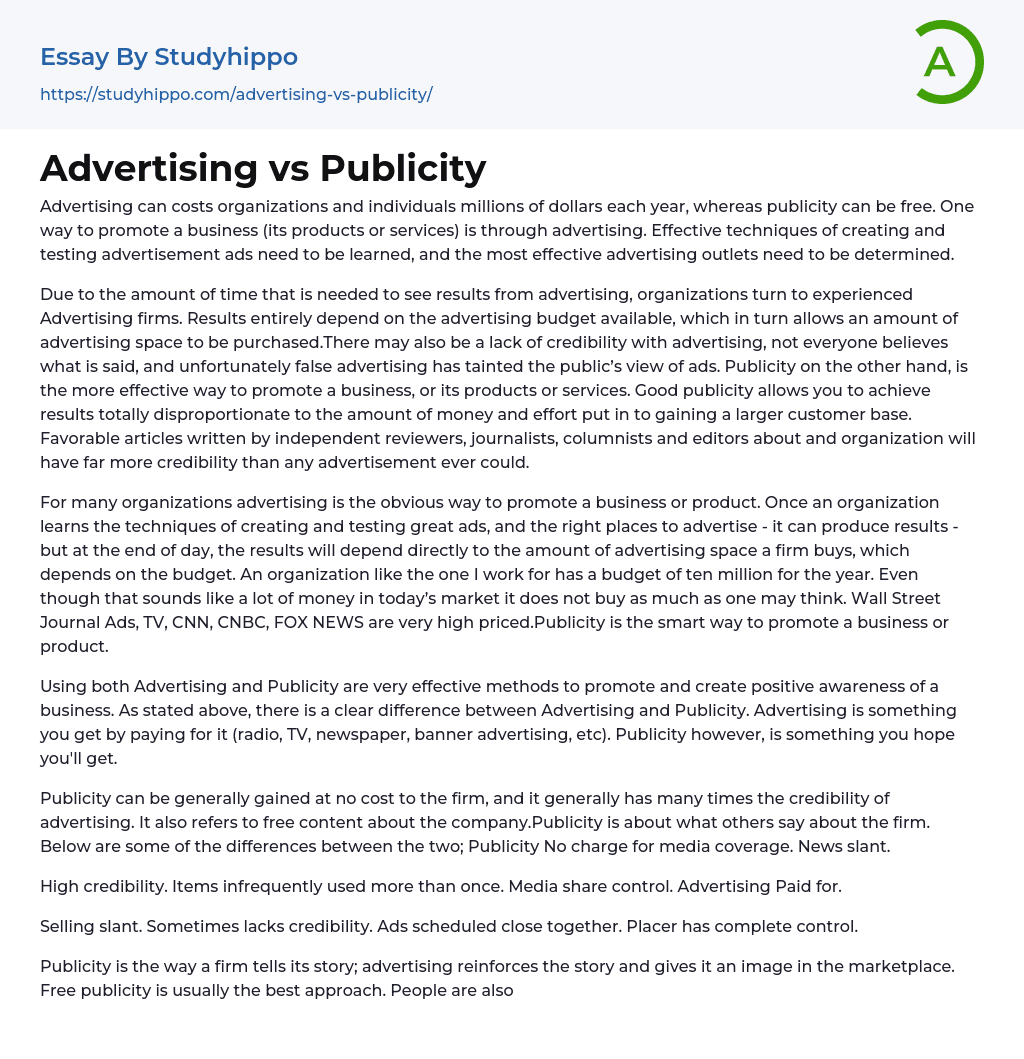Although advertising can be costly for individuals and organizations, it is feasible to obtain publicity without paying any money. Advertising is frequently used by companies as a marketing tool. To be successful in this area, it's crucial to understand different effective approaches for developing and evaluating ad campaigns, as well as determining the most suitable platforms for advertising.
Organizations seek experienced advertising firms for their capacity to produce outcomes in a reasonable timeframe, as ad space is restricted by the budget, which largely determines the effectiveness of advertising. Public trust in this form of promotion has been damaged by false advertising. Publicity is a more efficient way of promoting a business and its products through favorable coverage from independent reviewers, journalists, columnists, and editors that carries greater weight than any advertisement.
Many organizations opt for adv
...ertising to promote their business or product, but success depends on mastering ad creation and testing techniques as well as identifying effective advertising venues. Ultimately, budget constraints limit the amount of advertising space firms can afford and determine the success of an advertising campaign. At my organization, we have a yearly budget of ten million dollars which may seem substantial; however, high-priced options like Wall Street Journal Ads, TV commercials on CNN, CNBC and Fox News can quickly exhaust our funds. As a result, publicity often proves to be a more astute way to promote our business or product.
Both Advertising and Publicity are highly efficient strategies for promoting and generating favorable awareness of a business. Nevertheless, there exists a distinct contrast between the two, wherein Advertising is obtained by monetary compensation for exposure on various platforms such as radio, TV, newspaper, banner
advertisements, et cetera. Conversely, Publicity is something businesses aspire to receive.
Publicity, which generally holds greater credibility than advertising, can be obtained without cost to the firm. It pertains to free content regarding the company and is essentially what is said about the firm by others. Differences between publicity and advertising include free media coverage and a news slant in publicity.
Media control is shared and advertising is paid for, despite the infrequent use of highly credible items.
While placing ads, the seller may use biased language, leading to a loss of credibility. Additionally, scheduling ads too close to each other may diminish their impact. It's important to note that the placer retains full control over the ad placement process.
Publicity and advertising are both crucial in communicating a company's story and branding. While advertising establishes an image in the market, free publicity is often the most effective approach in attracting people's interest. News articles are generally more appealing than advertisements. Therefore, a combination of advertising and publicity is recommended to effectively promote your company.
Advertising can be a costly way of communicating your message to a specific audience. Paying for every advertisement, commercial or online display banner that you run can quickly add up for companies on a limited budget. In order to reach the desired number of readers, listeners or viewers with the necessary frequency, repetition is often required, further increasing costs. For example, just one advertisement in a major consumer magazine can be more expensive than an entire year's publicity program. On the other hand, for the same cost as one advertisement, a publicity program can generate multiple stories in that same consumer magazine and throughout the
year produce numerous stories in other consumer magazines, newspapers, books, trade journals, on the internet as well as radio and TV broadcasts. Since advertising space or time is purchased by payment, the company has control over it.
Advertising allows for predetermined control over the message, its location and frequency, providing organizations the ability to create blatantly persuasive, colorful, and dramatic advertisements. Publicity, on the other hand, lacks control over space, time, and content since organizations do not pay for its publication. However, publicity often appears in editorial content, which results in increased credibility compared to paid advertising.
The credibility of a successful publicity placement is higher than that of paid advertising, as the audience recognizes that the latter is biased due to the purchase of ad space. Conversely, the former gains believability through the implicit endorsement of the media.
- Sales Promotion essays
- Advertising campaign essays
- Advertisement essays
- Advertising essays
- Anheuser-busch essays
- Audience Theory essays
- Brand essays
- Brands essays
- Competitor Analysis essays
- Consumer essays
- Detergent essays
- Marketing Management essays
- Marketing Mix essays
- Marketing Plan essays
- Marketing Research essays
- Marketing Strategy essays
- New Product Development essays
- Point Of Sale essays
- Price essays
- Procurement essays
- Product essays
- Product Differentiation essays
- Product Placement essays
- Promotion essays
- Promotion And Marketing Communications essays
- Research Design essays
- Retailing essays
- Trademark essays
- Collaboration essays
- Dialogue essays
- Fake News essays
- Journalism essays
- Mass Media essays
- Media Analysis essays
- Media Bias essays
- Media Studies essays
- Message essays
- News essays
- Propaganda essays
- Radio essays
- Rogerian Argument essays
- Role of Media essays
- Social Media essays
- Social Media Marketing essays
- Social Networking essays
- Youtube essays




